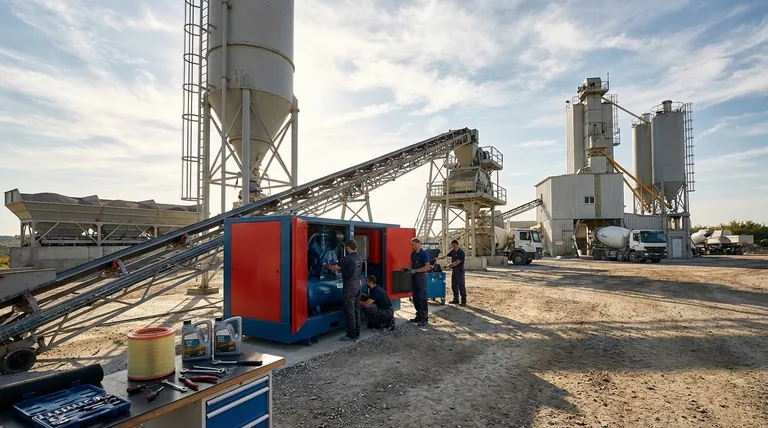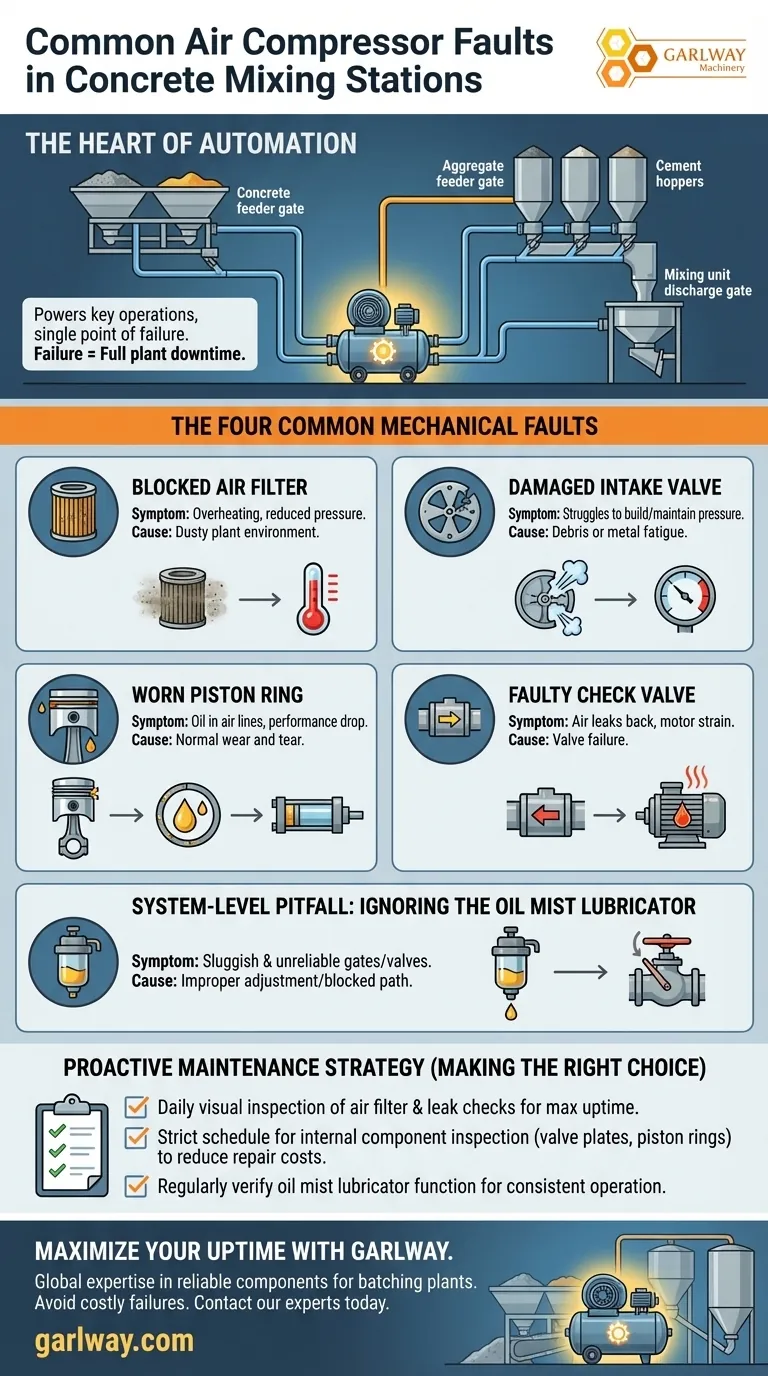The most common air compressor faults in a concrete mixing station stem from four key mechanical areas: a blocked air filter, a damaged intake valve plate, worn piston rings, and a faulty check valve. These components are critical for generating the pressure needed to operate the plant's pneumatic systems.
An air compressor failure is a full plant failure. Understanding that most faults originate from either contamination or mechanical wear is the key to shifting from reactive repairs to a proactive maintenance strategy that prevents costly downtime.

The Critical Role of Compressed Air in Your Plant
Your air compressor is the heart of your plant's automation. It doesn't move concrete, but it powers the systems that control the entire production flow.
Powering Key Operations
The compressor provides the pneumatic force to operate feeder gates for aggregates, butterfly valves on cement and water weigh hoppers, and the main mixing unit discharge gate.
A Single Point of Failure
When the compressor fails to deliver adequate pressure or volume, these components become sluggish or stop working entirely. This brings the entire batching and mixing process to a halt.
Diagnosing Common Mechanical Failures
Most compressor issues can be traced back to a handful of high-wear components. Knowing the symptoms can lead you to the root cause quickly.
Blockage of the Air Filter
This is the most frequent and easily preventable issue. The dusty environment of a concrete plant inevitably clogs the filter over time.
A blocked filter starves the compressor of air, forcing it to work harder to achieve pressure. This leads to overheating, reduced output, and premature wear on all other components.
Damage to the Intake Valve Plate
The intake valve is a simple but essential part that allows air into the cylinder. It can be damaged by debris that gets past a faulty filter or by simple metal fatigue.
A damaged or poorly sealed intake valve will significantly reduce the compressor's efficiency. You may notice the unit runs constantly but struggles to build or maintain pressure in the tank.
Severe Wear of the Piston Ring
Piston rings seal the compression chamber. As they wear down, compressed air "blows by" the piston into the crankcase.
The most obvious symptom is a noticeable drop in performance and, critically, the presence of oil in your compressed air lines. This oil can contaminate and damage the pneumatic valves and cylinders throughout your plant.
Damage to the Check Valve
The check valve is a one-way valve that prevents air from the tank from flowing back into the compressor head when the unit stops.
If this valve fails, the compressor will try to restart against the full pressure of the tank, which can trip the motor's thermal overload or cause severe strain. You may hear air leaking back through the compressor after it shuts off.
Common Pitfalls and System-Level Issues
Focusing only on the compressor unit itself is a common mistake. The health of the entire compressed air system is what truly matters for plant reliability.
Ignoring the Oil Mist Lubricator
Many pneumatic systems use an oil mist device to lubricate cylinders and valves downstream. This device can also be a point of failure.
An improperly adjusted needle, a blocked oil path, or a simple air leak can prevent the device from atomizing oil. The result is unlubricated components, which leads to the sluggish and unreliable operation of your gates and valves.
The Cost of Reactive Maintenance
Waiting for a component to fail is the most expensive maintenance strategy. The cost of plant downtime during a concrete pour far exceeds the cost of a replacement filter or valve plate.
Contamination from dust and moisture is the primary enemy of any compressed air system. A proactive approach focused on keeping the air clean and dry will prevent the vast majority of the failures described above.
Making the Right Choice for Your Goal
Your maintenance strategy should align directly with your operational priorities. A few simple, consistent checks can prevent most catastrophic failures.
- If your primary focus is maximizing uptime: Implement a daily visual inspection of the air filter and listen for audible air leaks in the system.
- If your primary focus is reducing long-term repair costs: Adhere to a strict schedule for inspecting internal components like valve plates and piston rings based on manufacturer-recommended operating hours.
- If your primary focus is ensuring consistent plant operation: Regularly verify that the oil mist lubricator is functioning correctly to prevent the sluggish gate and valve performance that ruins batch consistency.
Proactive monitoring of your compressed air system is the single most effective way to protect your plant's productivity.
Summary Table:
| Fault | Key Symptom | Primary Cause |
|---|---|---|
| Blocked Air Filter | Overheating, reduced pressure | Dusty plant environment |
| Damaged Intake Valve | Struggles to build/maintain pressure | Debris or metal fatigue |
| Worn Piston Ring | Oil in air lines, performance drop | Normal wear and tear |
| Faulty Check Valve | Air leaks back, motor strain | Valve failure |
Maximize your concrete plant's uptime with GARLWAY. Our expertise in construction machinery, including reliable components for batching plants, helps contractors globally avoid costly air compressor failures. Contact our experts today to discuss your plant's specific needs and ensure consistent, profitable operation.
Visual Guide

Related Products
- Ready Mixer Machine for Construction Ready Mix Machinery
- Commercial Construction Mixer Machine for Soil Cement Mixing Concrete
- Hydraulic Concrete Mixer Machine Cement Mixing Equipment for Mixture Concrete
- JZC400 Mobile Small Concrete Mixer Cement Mixer Machine
- Portable Concrete Mixer Machine Equipment for Mixing Concrete
People Also Ask
- What factors should be considered when choosing a concrete batch plant for a project? Ensure Quality, Cost, and Efficiency
- What are the disadvantages of ready mix concrete? Navigating Logistical and Cost Challenges
- What are the advantages of belt conveying for aggregates? Boost Efficiency & Reliability for Your Construction Site
- Why is the quality of the cement silo important in a concrete mixing plant? Ensure Reliable Concrete Production
- What is the working principle of a concrete batching plant? Precision Batching for Consistent Quality
- How does a screw conveyor function in a concrete batching plant? Precision Powder Transport Explained
- What should be considered when choosing a concrete reclaimer for business needs? Optimize Your Plant's ROI
- What are the benefits of automated operations in a batching plant? Achieve Higher Quality & Profits




